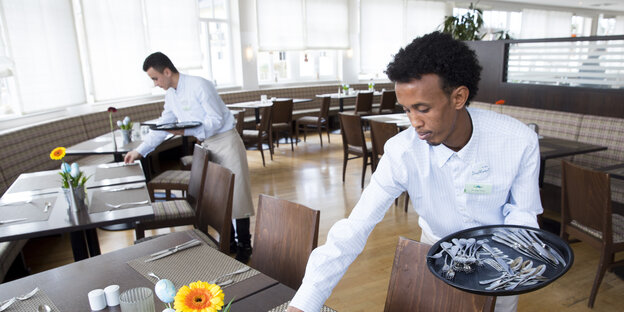The “All Aboard” network wants to house refugees in companies in Schleswig-Holstein. Many people want to work immediately, but the obstacles are great.

Before starting, a lot of permits are needed: refugees from Albania (left) and Eritrea work in the rural hotel on Sylt Photo: Christian Charisius/dpa
RENDSBURG taz | When she was looking for workers, Leah Raedisch attended a language course. The businessman runs the canteen of the Schleswig Higher Regional Court and has also rented the bistro and café of the neighboring Gottorf Castle State Museum. But he lacked people to cook, serve and organize the kitchen. The “All Aboard!” network, an initiative of the state of Schleswig-Holstein, helped her employ refugees. She met her future employees directly in the language course.
Today people from seven countries work in his company. One of them is Mazen Al Sarifi, 29, from Yemen. He has been in Germany for five years, now speaks good German and hopes to obtain citizenship. So, a complete success? Not entirely, reported Raedisch in a meeting in which the project actors and Tobias von der Heide (CDU), State Secretary at the Ministry of Labor in Kiel, participated. Given the bureaucratic obstacles, it is easier to hire people from abroad than to employ people who already live here.
What some sectors, such as gastronomy, are already feeling today, will become even more evident in the coming years: Schleswig-Holstein is running out of workers. In ten years, some 300,000 jobs could no longer be filled, almost 30 percent of the current labor market, says State Secretary von der Heide.
One way to close this gap is to promote “gray gold”, that is, keeping people in their jobs longer; Another way is to hire specialists abroad; To this end, the country has created a “Welcome Center” for companies and qualified workers who wish to enter the market. country can find all the relevant authorities under one roof. And then there are the people who are in the country anyway: the refugees.
Frustration for everyone involved
“People come here and want to get started,” says Pia Godemann, who is responsible for integration in the district of Schleswig-Flensburg and advises refugees as a member of the “All on board” network. But many times this is not as easy as expected. Some of the new arrivals had traumatic experiences in their country of origin or while fleeing, which sometimes makes integration difficult: “At first we were too euphoric,” says Edda Hamer, head of labor integration at the Ministry of Kiel. Labor and Economic Affairs.
For others, formal obstacles get in the way: “Someone might want to work as a baker or in a daycare. But for that you need training and a language course, and for that you have to wait a good year and a half,” says Godemann, describing a typical waiting loop. This means frustration for everyone involved: for refugees who would like to work, as well as for companies that urgently need workers.
In reality, the federal government is responsible for job placement, also through the Federal Employment Agency. But there are gaps and “we want to fill them,” says Edda Hamer. An example is language training, in which participants also learn specialized vocabulary for their respective profession. The goal is to keep the knowledge of the basic courses alive. “One of the main tasks of consulting is to keep people on track and continually motivate them,” says Godemann.
Hamer recalls the numerous cases in which mediation was successful. More than 25,000 people who have fled in recent years from countries outside Ukraine, to which special rules apply, are now working in Schleswig-Holstein. “These are great successes that we must not forget,” says Hamer. State Secretary von der Heide highlighted that the “All Aboard!” contributes to it.
Unreachable offices
Since 2022, around 1,500 people have taken advantage of a course or advice. In a previous project that started in 2017, there were another 2,580 people, half of them women. The advisory network, present in seven districts and the city of Flensburg, will receive around 3.7 million euros throughout the mandate, of which around 1.5 million will come from the European Social Fund Plus. In the rest of Schleswig-Holstein, refugees receive a similar counseling service through a second network funded by the federal government.
But despite the help, it is still difficult to get all the permits so that workers can start working, reports restaurateur Leah Raedisch: “No one answers the phone in the offices, no one answers emails. In the end, the only thing that help is.” contact the future employee to queue in front of the office to solve the problem directly. “I heard from colleagues that they would like to hire people, but the effort is not affordable. “It is currently trying to bring workers directly into the country.” But there is also a problem here: “I have the impression that the German embassies make entry unnecessarily difficult.”
